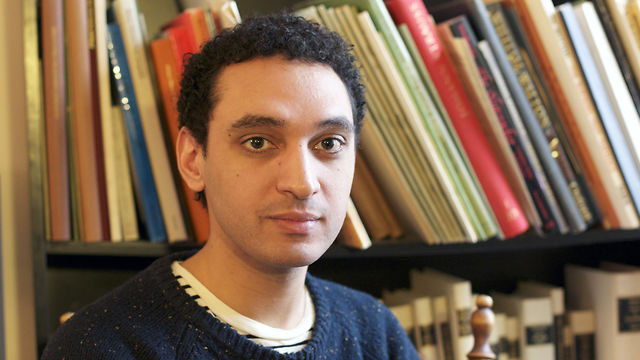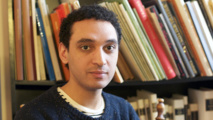The belief, Fairouz says, is that both music and poetry have a power to bring greater understanding, if only people take the time to listen and reflect.
"In order to make war, you have to dehumanize somebody -- this is a very well-known fact. It's much more difficult to dehumanize a group if you love their music and their poetry," Fairouz told AFP over a mug of tea at a New York recording studio.
"It's very dramatic to talk about civilizational war and I don't believe that will be the case. But I think we have to tone down the volume a little bit because we have mutually assured destruction -- if we go to war against each other, it is going to be devastating for both civilizations and take everybody back millennia," he said.
Fairouz, an American who traces his ancestry to several parts of the Arab world, finds himself thinking poetically even on instrumental work. He said he writes lyrics that go unsung, with Fairouz the only one to know the hidden words unless he shares with the performers.
- Not just 'dead white men' -
With "Follow, Poet," Fairouz is the youngest composer to record a full album for the 115-year-old classical label Deutsche Grammophon. Along with poems by Auden and Heaney, the album features John F. Kennedy, who is heard declaring, "When power corrupts, poetry cleanses."
A highlight of the album is "Sadat," Fairouz's ballet on the slain Egyptian president. The ballet -- with five scenes in Anwar Sadat's life including his peace mission to Jerusalem and his assassination -- will premiere at Carnegie Hall on May 26.
"Audenesque," a musical exploration of Auden's poetry that is also on the album, will be performed on February 23 by mezzo-soprano Kate Lindsey at New York's experimental (Le) Poisson Rouge club.
While firmly in the Western tradition, Fairouz's work frequently glides into the maqam modes that underpin classical Middle Eastern music.
Fairouz said that his conceptions of music were transformed on a visit to Karachi when he heard the spiritual performances of Sindhi fakirs and sensed a connection to opera.
Fairouz, who dresses casually and picks words carefully, said it was important to be "a cosmopolitan entity" in an increasingly interconnected but that his approach has faced a backlash in classical circles.
"I'm not necessarily as interested as some think I should be in the exclusive domain of white men -- especially dead white men -- over musical composition," he said.
"If we don't already live in a post-colonial world, then we must go there very quickly, because the alternative is quite dangerous," he said.
Fairouz is also working on two operas including one on former Pakistani prime minister Benazir Bhutto, a reflection of his fascination with leaders who died tragically.
Among Fairouz's other new works is "Locales," a musical exploration of five cities -- Beirut, Abu Dhabi, Paris, London and New York -- that will premiere Saturday with oboist Ian Shafer at Carnegie Hall.
- The power of words -
As Fairouz strives for an era of more expression, international tensions have flared after the massacre in Paris of Charlie Hebdo cartoonists who had satirized the Prophet Mohammed.
Fairouz voiced disgust over the killings. Yet he also said that anyone with a basic understanding of Islam would understand the sensitivity of depicting Mohammed.
"We should not be in a competition of cultures on how to best offend one another," he said. "The debate should be about how we get around the table and have a constructive conversation."
Fairouz called literature the "foundational art form" in Arab culture. But he worried that the same was not as true in the United States.
"We have slogans like, 'Walk the walk, and don't talk the talk," and tropes like, 'Words are cheap.'
"Well, sure, words can be cheap, they can be empty, but they can also prevent armies from marching to war against each other and can prevent millions of people from dying."
-------------------------------------------------------------------------------------
"In order to make war, you have to dehumanize somebody -- this is a very well-known fact. It's much more difficult to dehumanize a group if you love their music and their poetry," Fairouz told AFP over a mug of tea at a New York recording studio.
"It's very dramatic to talk about civilizational war and I don't believe that will be the case. But I think we have to tone down the volume a little bit because we have mutually assured destruction -- if we go to war against each other, it is going to be devastating for both civilizations and take everybody back millennia," he said.
Fairouz, an American who traces his ancestry to several parts of the Arab world, finds himself thinking poetically even on instrumental work. He said he writes lyrics that go unsung, with Fairouz the only one to know the hidden words unless he shares with the performers.
- Not just 'dead white men' -
With "Follow, Poet," Fairouz is the youngest composer to record a full album for the 115-year-old classical label Deutsche Grammophon. Along with poems by Auden and Heaney, the album features John F. Kennedy, who is heard declaring, "When power corrupts, poetry cleanses."
A highlight of the album is "Sadat," Fairouz's ballet on the slain Egyptian president. The ballet -- with five scenes in Anwar Sadat's life including his peace mission to Jerusalem and his assassination -- will premiere at Carnegie Hall on May 26.
"Audenesque," a musical exploration of Auden's poetry that is also on the album, will be performed on February 23 by mezzo-soprano Kate Lindsey at New York's experimental (Le) Poisson Rouge club.
While firmly in the Western tradition, Fairouz's work frequently glides into the maqam modes that underpin classical Middle Eastern music.
Fairouz said that his conceptions of music were transformed on a visit to Karachi when he heard the spiritual performances of Sindhi fakirs and sensed a connection to opera.
Fairouz, who dresses casually and picks words carefully, said it was important to be "a cosmopolitan entity" in an increasingly interconnected but that his approach has faced a backlash in classical circles.
"I'm not necessarily as interested as some think I should be in the exclusive domain of white men -- especially dead white men -- over musical composition," he said.
"If we don't already live in a post-colonial world, then we must go there very quickly, because the alternative is quite dangerous," he said.
Fairouz is also working on two operas including one on former Pakistani prime minister Benazir Bhutto, a reflection of his fascination with leaders who died tragically.
Among Fairouz's other new works is "Locales," a musical exploration of five cities -- Beirut, Abu Dhabi, Paris, London and New York -- that will premiere Saturday with oboist Ian Shafer at Carnegie Hall.
- The power of words -
As Fairouz strives for an era of more expression, international tensions have flared after the massacre in Paris of Charlie Hebdo cartoonists who had satirized the Prophet Mohammed.
Fairouz voiced disgust over the killings. Yet he also said that anyone with a basic understanding of Islam would understand the sensitivity of depicting Mohammed.
"We should not be in a competition of cultures on how to best offend one another," he said. "The debate should be about how we get around the table and have a constructive conversation."
Fairouz called literature the "foundational art form" in Arab culture. But he worried that the same was not as true in the United States.
"We have slogans like, 'Walk the walk, and don't talk the talk," and tropes like, 'Words are cheap.'
"Well, sure, words can be cheap, they can be empty, but they can also prevent armies from marching to war against each other and can prevent millions of people from dying."
-------------------------------------------------------------------------------------









 Home
Home Politics
Politics











